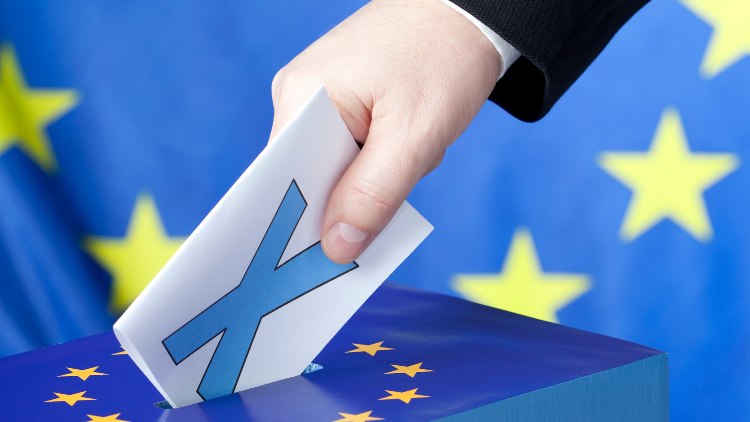South Asian Perspective
South Asian Perspectives on European Parliament (EP) Election 2024

EU Voting
© By ericsphotography from Getty Images Signature via Canva ProHistorically, South Asian aspirations towards the European Union (EU) and the European Parliament (EP) have primarily focused on obtaining developmental aid, gaining access to EU markets, and strengthening public institutions. In contrast, the European Union has prioritized the promotion of the rule of law and political democratization in South Asia. However, given the current global conditions—including ongoing conflicts in Ukraine and West Asia, the global economic slowdown, and the increasing influence of China—expectations are likely to diversify. These expectations will now also encompass global economic recovery, bilateral trade, security, and geopolitical considerations.
Both regions might have their own share of expectations under the configuration of the new EP. The following themes will center the EP agenda for South Asia in general.
- Trade: Currently, the trade and services between South Asian nations are mostly governed by the Most Favored Nation (MFN) principle of World Trade Organization (WTO) rules. Additionally, the European Union (EU) provides tariff benefits to South Asian countries through the Generalized Scheme of Preferences (GSP). India is now in negotiations with the European Union for a trade agreement, whereas other South Asian countries primarily engage in trade under the Generalized System of Preferences (GSP) arrangement. The new EP will closely monitor this trade agreement with India, as it must approve the agreement for it to come into effect.
- Limiting Chinese influence in South Asia: Though the EU’s official China policy looks ambivalent, the EU policymakers have expressed concerns over expanding Chinese global ambitions and especially over the Indo-Pacific region (encompassing South Asia) over their bilateral meetings in different forums and in sideline meetings between leaders.
- Climate cooperation: This will also continue to top the agenda of both regions and with increasing awareness and interest of the European citizens, the new EP will prioritize this under its foreign policy. Given the high susceptibility of South Asia’s population to the impacts of climate change, this area is poised to garner significant attention for cooperation with the EP and EU at large.
- Refugee crisis: Both regions are currently experiencing a refugee crisis due to an increasing number of Afghan refugees in the European Union and Rohingya refugees in Bangladesh and India. Addressing this situation will be a shared priority for the next 6 years of EP as the refugee crisis has shown a ripple effect in neighborhoods and threatens global human security through human trafficking and terrorism.
- Skilled immigration: The European Union faces a significant shortage of skilled workers and is looking to South Asia to address the deficits across various sectors. The European Parliament's views on migration from South Asia are diverse, reflecting its members' varied interests. Countries like India are valuable partners due to their pool of trained professionals in IT, engineering, and healthcare. South Asia could be instrumental in alleviating the EU's skills deficit through skilled migration.
- Promoting democracy: Democratic political systems are facing strain in several South Asian nations, including Afghanistan, Sri Lanka, Pakistan, Maldives, and Nepal. The upcoming EP will continue its advocacy for strong democracy and developing democratic institutions in South Asian nations.
Country-Specific Perspectives:
India is expected to receive more attention from the new European Parliament (EP) due to its global economic and geopolitical relevance. The Indian administration aims to pursue a trade deal and seek ratification by the EP, similar to the recently completed agreement with the EFTA zone. India seeks a broader perspective from the EP regarding global issues beyond those related to the Euro-Atlantic region (GLOBSEC Bratislava forum, 2022). The European Union and India have demonstrated positive signs of enhancing their relationship with the establishment of the India-EU Commercial and Technology Council. This council aims to address significant commercial, economic, and technological issues, with the goal of reducing world reliance on Chinese manufacturing and global supply chain. India anticipates the new European Parliament to show greater sensitivity to regulating foreign financing received by Indian NGOs from EU nations, especially under the social window of funding scheme.
With the Taliban takeover of Afghanistan in 2021, the new EP needs to renew its focus on revisiting Afghanistan's policies and mitigating human suffering. Also, Pakistan's political and security challenges will dominate the South Asian agenda of the new EP, with increased financial aid and cooperation, as Pakistan’s economic condition worsens. Apart from the Rohingya crisis, Bangladesh seeks EP’s support in extension of preferential treatment under GSP as it transits out of the LDC category. The Maldives is addressing climate change threats and seeking increased support in green practices and climate adaptation efforts. They also aim to negotiate a visa exemption agreement with the EU. Bhutan, Nepal, and Sri Lanka prioritize trade development and seek to expand export quotas in accordance with WTO and GATT principles. They also seek increased support from the European Parliament (EP) for foreign aid and development.
Analysis on Potential EP Electoral Outcome
The upcoming European Parliament election may witness a significant rise in ideologically right-wing political groups across Europe. Efforts are underway to establish a cohesive right-wing ideological alliance in the European Parliament by uniting the European Conservatives and Reformists (ECR) with the Identity and Democracy (ID) party. The growing presence of right-wing parties sharing a common ideology may introduce a new perspective on South Asia, potentially resulting in decreased regional cooperation. These parties advocate for a reformed European Union that prioritizes internal affairs. Consequently, the allocation of developmental aid for South Asia may be reduced with increased right-wing representation in the European Parliament. Additionally, South Asian countries are keenly anticipating the next European Parliament elections, irrespective of ideological outcomes, as a potential means to resolve the Russia-Ukraine crisis and stimulate global economic growth, which has been impeded by the ongoing conflict.
